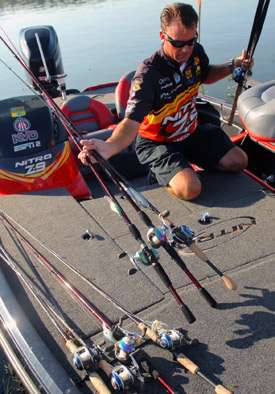
"The most important thing about choosing a fishing rod is to get the one that works for you," says two-time Classic Champion, Kevin VanDam. Simply put, "a 'good' fishing rod is one that helps you fish effectively and efficiently with the lure you are using.
"Too many anglers worry about materials, mechanics and names. Those things are important but the ultimate standard is to choose a rod that performs the task at hand properly. There's really no other way to judge a rod."
He continues by pointing out that if you're throwing a small, shallow running crankbait, you need a rod with the proper action and tip that lets you cast accurately. Precise lure placement matters. On the other hand, if you're throwing a big, heavy deep-diver you need power and a rod that'll let you make long casts. Accuracy is less important.
The same rod — no matter how high the quality of its materials and construction — won't do the same job. If you do use the same rod for both applications, one of them is not a good rod because it won't perform properly.
That sounds great in theory but there's a practical, real-world problem with it — money. Most of us can't afford to purchase a special rod for every type of lure we throw. We have to make do with what our budgets allow.
What to do? VanDam recommends we start with three rods that are acceptable for most applications. He then recommends add-ons based on where we bass fish and our level of experience.
KVD's Basic 3
1. Start with a 6-foot, 10-inch, medium-heavy action baitcaster. That rod will handle most spinnerbaits, crankbaits, lipless crankbaits, jerkbaits and topwater plugs.
2. He also recommends we carry a 7-foot, medium action spinning rod with a high speed reel. That'll work for most finesse applications such as drop shotting, shaky heads and weightless worms.
3. A 7-foot, 2-inch heavy casting rod will round out the arsenal. It'll manage heavy cover applications such as flipping or pitching, and it work frogs effectively.
Those are the basics. They aren't all going to be perfect, but they're a start. Most lures, rigs and applications can be fished effectively in most parts of the country with one of them.
VanDam stresses another factor that he believes is critical to fishing success — compatibility. "Every company's rods are different. They all have different blanks, different handles, different guide spacing, different actions, different tips and a different overall feel. It's important that all your rods be from the same company.
"Now, I design rods for Quantum. I think they're the best in the industry. I'd like to see you buy ours. But, if you like another manufacturer's rods better, you should buy them. And I mean buy all of your rods from them. Don't mix and match.
"If you're going to become a better bass angler you've got to be able to cast quickly and accurately with good rods. You can't do that if every time you pick up a rod and reel it takes you 10 minutes to readjust. You can't afford to waste that much time.
"If all your rods and reels are the same, you'll feel comfortable immediately when you switch outfits. I can't stress how important that is to becoming a better anger. It's critical, absolutely critical, that all your rods and reels are from the same company."
VanDam says he can't recommend additional rod choices unless he knows an angler's particular circumstances. "I can't pick another two or three must-have rods unless I know where an angler's going to be fishing and how much experience he or she has," he explains. "Every situation is different.
"In Michigan, where I'm from, there are a lot of shallow, clear natural lakes. And, we fish a lot for smallmouths. Long spinning rods are popular here. If you live in Florida, however, you'll probably need a heavy flipping rod, something that'll get you through the heavy weeds and vegetation.
"When I worked in my brother's tackle store in Kalamazoo — R & D Sports Center — I frequently recommended anglers not buy additional rods too soon. If you're new to our sport take some time and go fishing. Don't get in too big of a hurry. Find out what works for you and what techniques are popular in your neck of the woods before you buy more rods."
Finally, a word or two about price: According to VanDam you generally get what you pay for with fishing rods. He says the biggest problem with cheap rods is that the blanks and actions aren't uniform. The rods vary from one to another.
VanDam is an angler noted for demanding perfection in every product he endorses. His new Signature Series crankbait rods from Quantum will retail for around $150.




